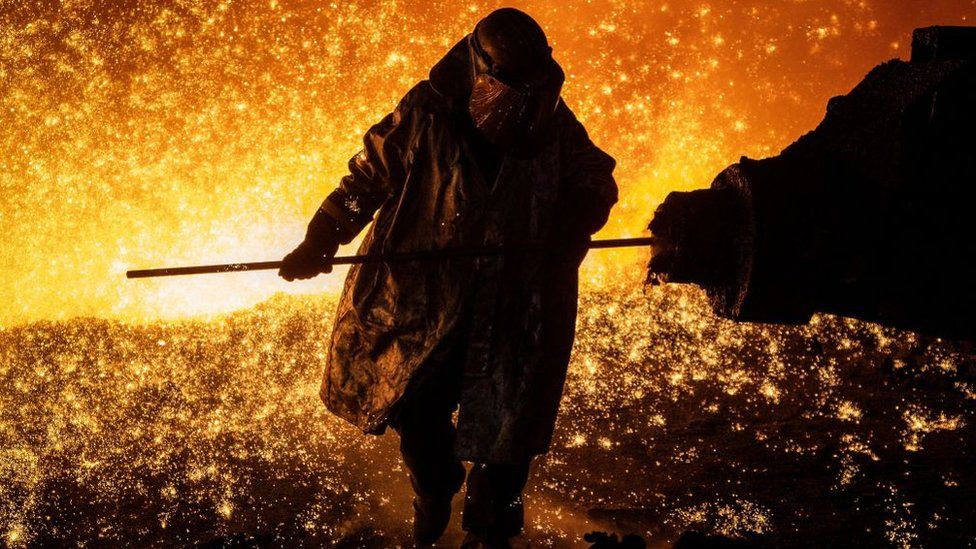ARTICLE AD BOX
 Image source, Getty Images
Image source, Getty Images
Both the blast furnaces in the Port Talbot works are to close in a transition to electric arc furnaces
By Paul Pigott & Ben Price in Port Talbot
BBC News
Tata Steel is to push ahead with plans to close both its blast furnaces in Port Talbot with the expected loss of 3,000 jobs UK-wide, the BBC understands.
Most are expected to go by September, with the majority in Port Talbot where the steelworks will be transitioned to a greener electric arc furnace.
Unions called it a "crushing blow" and the "worst-case scenario".
The UK government said it will support employees and the local economy.
Tata Steel currently employs 8,000 people, with about 4,000 based at the UK's largest steelworks in Port Talbot, which has two coal powered blast furnaces.
The BBC has been told the first job losses are likely to begin in April, with more in September.
Tata Steel's decision - set to be formally announced at 11:30 GMT Friday - follows a meeting between company executives and the Community, GMB and Unite unions.
Sources said Tata rejected the unions' proposal to avoid redundancies by keeping one blast furnace going during the transition.
The Indian-owned firm will instead spend £1.25bn - including a £500m UK government subsidy - on its move to a method of steelmaking that will cut carbon emissions and stem financial losses on its UK operations of £1m a day.
It will be more environmentally friendly to operate, but require a smaller workforce.
Hollywood actor Michael Sheen says the steelworks are Port Talbot's North Star
It will be most difficult for "technical people like the electricians, the fitters", explained Shaun Spencer, a 38-year-old electrical engineer at the site.
"There's going to be a lot of high-quality jobs gone, and I don't know where they're going to be replaced," he added.
Casey Jones, 24, from Sandfields in Port Talbot said: "It's very sad, we've got a lot of people we know at Tata and the steelworks, this town, everything is going to die, because we rely on the steel."
Casey Jones, 24, says she has a "love-hate relationship" with the steelworks, torn by the jobs it creates versus the environmental damage it causes
"Personally it's like a love-hate relationship," she said of the steelworks.
"It's really bad for the environment but again it generates so many jobs, therefore everyone is going to be impacted."
Former steelworker Nigel Thomas Hunt, who lost his job in a round of cuts in 2016, said the town is difficult to imagine without the blast furnaces.
"We smell them and we hear them… that's the sound of home," he said.
Image source, Getty Images
Image caption,The blast furnaces at Tata Steel's plant in Port Talbot is powered by coal
A UK government spokesperson said: "We are determined to secure a sustainable and competitive future for the UK steel sector."
They added support for staff included £80m in funding from UK government and £20m from Tata Steel.
But Stephen Kinnock, Labour MP for Aberavon, urged Tata Steel and the UK government to rethink their approach.
"By pursuing a narrow electric arc furnace-only model, Tata Steel will be unable to seize the commercial opportunities of the future, while at the same time leaving Britain more dependent on imported steel from countries whose governments won't always have Britain's best interests at heart," he said.
Wales' Economy Minister, Vaughan Gething said: "This is not just an issue for Wales, steel is a sovereign asset and should be treated as such by the UK government."
But the Welsh Secretary David TC Davies said: "Tata were always very clear - that they were either going to close the plant completely and that would've cost 8,000 jobs, or that they might be able to save jobs through an arc furnace.
"That's why we've done everything we can to protect as many jobs as we can through putting up the money for the arc furnace."
BBC Wales Business Correspondent has been in Port Talbot where thousands of steel workers face redundancy
Huw Thomas, business correspondent in Port Talbot
It's a bright winter's day in Port Talbot but the mood here is incredibly dark.
The news emerging from the meeting in London has shocked people, some of whom have stopped to ask journalists outside the steelworks for the latest information.
The rejection of the union's plan, and a decision to press ahead with the sudden closure of the blast furnaces, represents the worst case scenario for the workforce and the community which depends on Tata Steel.
How quickly the plan is implemented, and how much support can be offered to the workforce, are just some of the questions that people here want answered.
Unions will consult their members on how to respond to job losses, with industrial action not being ruled out.
Sources said Tata accepted a union plea to keep the hot strip mill open over a transition period, supporting hundreds more jobs.
But Sharon Graham, general secretary of Unite, accused Tata Steel of "playing games with people's livelihoods".
"Whatever and however they announce their plans for Port Talbot, Unite will fight tooth and nail to defend steel workers and our steel industry," she said.
She added the UK government "now needs to step in and step up".
Alan Coombs, a Community union representative, said it will be "disastrous" if the plans go ahead.
Image source, Getty Images
Image caption,Tata Steel employs about 4,000 people at its site in Port Talbot
"It's a difficult situation," he said.
"The worry's turning to anger, there's a lot of anger."
"Large scale job losses would be a crushing blow to Port Talbot and UK manufacturing in general," said GMB boss Charlotte Brumpton-Childs.
The site is a significant contributor to the Welsh economy - Tata said that in 2020-21 it contributed 3% of the total economic output and it paid average salaries that were 36% higher than the UK average.
Unions produced their own alternative plan which recommended at least one blast furnace remained in Port Talbot until the new electric arc furnace was ready to come online.
Its plan suggested around 700 jobs would go, but two of the unions were confident that this figure could be achieved through voluntary redundancies.
Are you a Tata Steel worker? Share your views and experiences by emailing haveyoursay@bbc.co.uk.
Please include a contact number if you are willing to speak to a BBC journalist. You can also get in touch in the following ways:
If you are reading this page and can't see the form you will need to visit the mobile version of the BBC website to submit your question or comment or you can email us at HaveYourSay@bbc.co.uk. Please include your name, age and location with any submission.

 1 year ago
87
1 year ago
87








 English (US) ·
English (US) ·